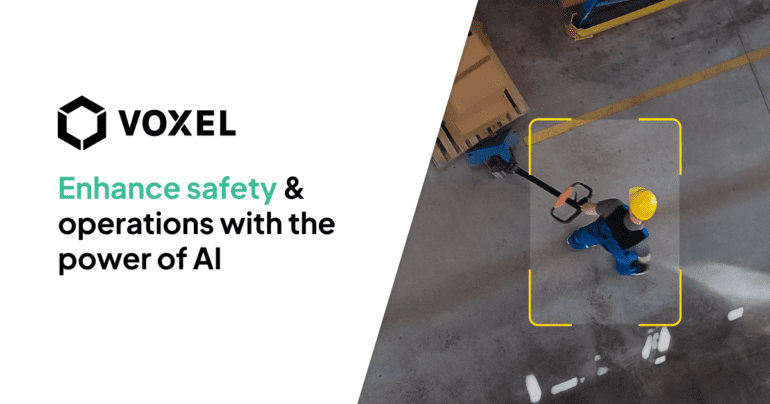TL;DR:
- Voxel addresses the staggering issue of 340 million annual workplace incidents with its pioneering computer vision technology.
- The startup secured $12 million in strategic funding, led by Rite-Hite, and has achieved a cumulative funding of $30 million since 2020.
- Voxel’s distinct approach integrates with existing security cameras, detecting hazards such as collisions and ergonomic risks, and alerts are sent in real-time.
- Key clients include Michael’s, Dollar Tree, Clorox, PPG Industries, and Office Depot.
- Founded by visionary CEO Alex Senemar and co-founders with impressive tech backgrounds.
- Voxel’s AI automates safety processes, offering video-based coaching and analytics, setting it apart from manual methods.
- Ethics-driven, Voxel prioritizes privacy by not using facial recognition and offering facial blurring.
- Significant success with clients, including a 77% reduction in injuries for Americold, leading to $1.1 million savings.
- Voxel’s expansion plans target diverse industries and global markets.
Main AI News:
In the dynamic landscape of workplace safety, where challenges seem as numerous as opportunities, the startling estimate from the International Labour Organization stands strong: a staggering 340 million workplace incidents occur annually. Amid this concern, Voxel emerges as a beacon of innovation, leveraging cutting-edge computer vision technology to champion a safer work environment.
In an epoch-making stride towards this mission, Voxel has orchestrated a triumphant funding coup, securing a formidable $12 million in strategic investment. Spearheading this funding drive is manufacturing titan Rite-Hite, joined by steadfast supporters Eclipse Ventures and MTech. A resounding achievement, this recent inflow bolsters Voxel’s cumulative funding since 2020 to a formidable $30 million.
Voxel’s distinct prowess stems from its fusion of technology and pragmatism. Unlike its peers in the computer vision realm, Voxel’s brilliance lies in its seamless integration with existing security camera systems. A game-changer for corporations, this approach eliminates the need for fresh capital outlays on equipment. By discerning potential hazards such as imminent vehicular mishaps, obstructed exits, compromised ergonomics, and inadvertent spills, Voxel ushers in a new era of safety vigilance. It accomplishes this feat by delivering real-time alerts directly to on-site personnel, ensuring swift intervention and mitigation.
The mantle of Voxel’s user base is proudly borne by influential entities, including Michael’s, Dollar Tree, Clorox, PPG Industries, and Office Depot. Underpinning this triumphant narrative is the visionary leadership of CEO Alex Senemar, whose past laurels include the founding of Sherbit—a pioneering AI-driven remote health monitoring platform for hospitals—acquired by Medopad in 2018. Senemar’s journey intertwines with co-founders like CTO Anurag Kanungo, an architect of Sherbit’s success, who also lends his expertise as a software engineer in Uber’s autonomous vehicle division. The ensemble is further enriched by Harishma Dayanidhi, renowned for her contributions to self-driving car technologies at both Uber and Aurora, alongside former Google software engineer Troy Carlson. The assembly culminates in a 50-member strong team that epitomizes innovation.
Senemar’s vision finds resonance in the unexplored potential of AI and computer vision for workplace safety. Traditionally, the realm of safety has leaned on manual oversight, intermittent spot checks, and post-factum incident documentation. Senemar astutely observes the limitations of this approach, which often sidesteps near-miss incidents and lacks the immediacy required for effective solutions. Voxel disrupts this paradigm by orchestrating an automated process that transcends mere surveillance. Enriched by video-based coaching and analytical acumen, safety teams are empowered to drive transformative changes.
Central to Voxel’s ethos is a steadfast commitment to ethics. Striking a harmonious balance between technological innovation and personal privacy, Voxel abstains from employing facial recognition or personal identification within its systems. Complementing this stance is the availability of facial blurring upon request. Furthermore, in the absence of safety concerns, captured footage is swiftly discarded, ensuring a conscientious approach to data.
Voxel’s crosshairs rest upon Fortune 500 titans entrenched in high-risk sectors—warehousing, retail, manufacturing, and energy. Notable among Voxel’s successes is its partnership with Americold, the preeminent cold-storage conglomerate. A spectacular 77% reduction in injuries materialized after Voxel’s implementation, culminating in a monumental $1.1 million in savings. The underlying factors for this transformation lay in the identification and mitigation of risk catalysts: from speeding forklifts to hazardous maneuvers at aisle endings, blindspots, and blocked drivable zones. Moreover, Voxel adeptly unearthed injurious behavioral patterns like improper ergonomics and unsafe lifting postures.
As Voxel navigates the future, it is poised for even greater strides. A foray into untapped industries, coupled with the infusion of predictive analytics, defines Voxel’s trajectory. The pursuit of global markets beyond North America signifies its expansive vision. Eloquent in its testament, Rite-Hite CEO Micaela Bomhack lauds Voxel’s transformative influence on workplaces, heralding the dawn of an era defined by enhanced safety, secured through Voxel’s technological marvels.
Conclusion:
Voxel’s revolutionary strides in AI-powered workplace safety underscore the monumental potential of technology to transform traditional safety practices. The startup’s seamless integration of computer vision with existing infrastructure marks a pivotal shift, streamlining hazard detection and intervention. With demonstrated success across industries and an ethically grounded approach, Voxel not only addresses immediate safety concerns but also sets the stage for the broader adoption of AI in redefining workplace safety standards. This watershed moment has the potential to reshape the landscape of workplace safety solutions, prompting businesses to reevaluate their strategies in favor of technologically advanced and efficient alternatives.

